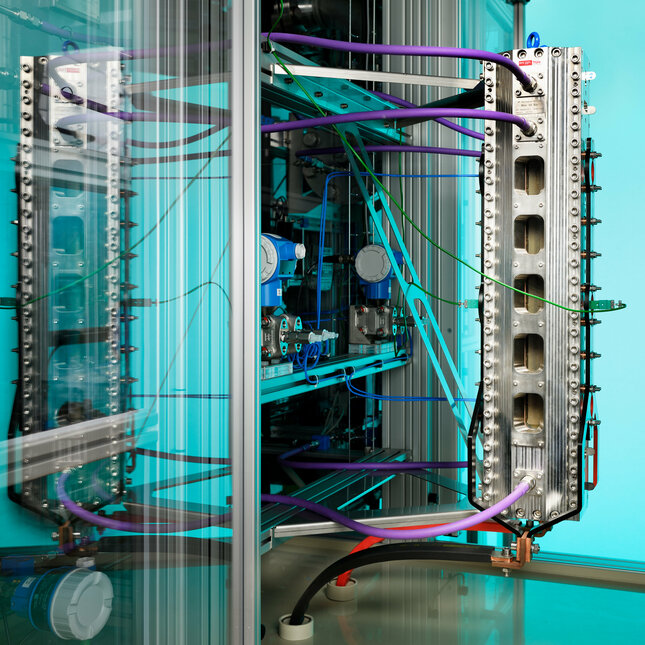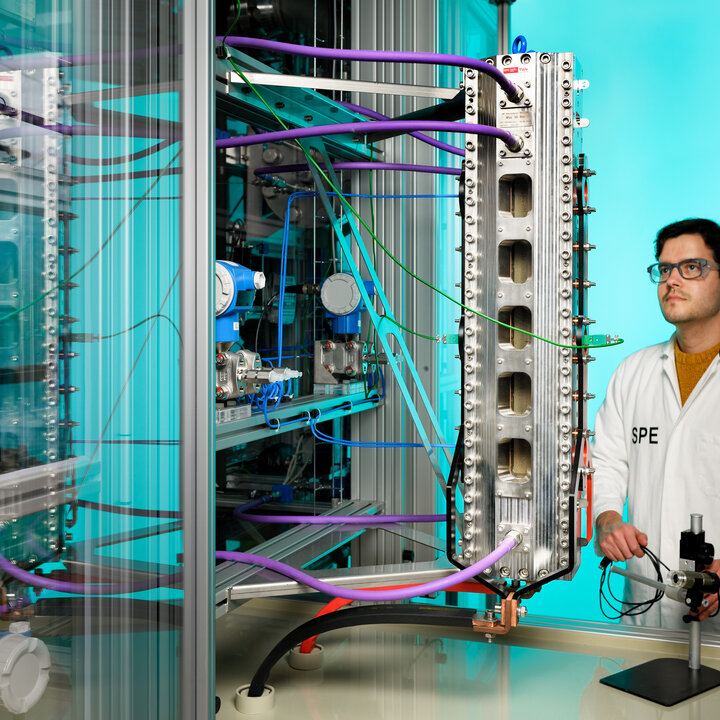
Electrochemical processes are an essential ingredient for the energy transition. Only with these processes we can transform the renewable electricity produced from solar and wind into the chemical building blocks we need for our society. One of these building blocks is green hydrogen which can be produced through the electrolysis of water. There are several water electrolysis technologies, all of them with their strengths and weaknesses.
At the Sustainable Process Engineering group, part of the department of Chemical Engineering and Chemistry at TU/e, we focus on Alkaline and Anion-exchange membrane (AEM) technology. Both of these technologies have the advantage of having a much smaller dependence on scarce noble and rare earth materials than competing technologies and therefore seem particularly suitable for large scale implementation. At the same time, there is a need for innovation to decrease production costs and make the technologies more flexible and durable. One key aspect is the increase of current density, also known as intensification.
The research focus in our group is not limited to individual alkaline and AEM electrolyzer components, but also looks at the total cell and stack design and the interplay between the electrodes, the electrolyte, the ionomer and the membrane. Aspects that are covered include ohmic resistance, overpotentials, mass transport, gas crossover and degradation. Experiments are carried out under industrial conditions and cover aspects such as the effects of impurities and frequent shut downs. The research even extends beyond the electrochemical stack, addressing optimal balance of plant design and the interplay with the rectifier.
In our research characterization techniques such as high-speed cameras, microscopy and gas chromatography are combined with electrochemical techniques, especially electrochemical impedance spectroscopy (EIS) and different modeling techniques to build the fundamental understanding of the processes occurring inside the electrolyzer. We use 3D-printing to manufacture different electrochemical cell prototypes and make use of advanced electrochemical setups that enable us to operate at elevated temperatures and pressures.
Currently, the primary focus of the group is on water electrolysis, but this does not mean that other electrochemical processes are forgotten. In more mature processes such as the chlor-alkali process there is still much to be investigated and the new insights that will be generated can for example be used to develop predictive maintenance concepts for these electrolyzers.
The research area of “Electrochemical Engineering” focuses on the intensification of electrochemical reactors. Intensification makes it possible to decrease the investment costs of electrochemical processes. Given the key role of electrochemistry in the energy transition, this is essential to make the energy transition a success. For electrochemical processes, intensification implies an increase in current density without an increase in energy consumption. To make this happen we need better cell designs, better membranes, better electrode materials and operation at increased pressure and temperature.
meet our researchers
Key Publications
-
Senan F. Amireh,Paul Vermeulen,Rodrigo Lira Garcia Barros,Dongsheng Yang,John van der Schaaf,Matheus T. de Groot
Impact of power supply fluctuation and part load operation on the efficiency of alkaline water electrolysis
Journal of Power Sources (2023) -
Matheus T. de Groot,Rodrigo Lira Garcia Barros
Optimal operating parameters for advanced alkaline water electrolysis
International Journal of Hydrogen Energy (2022) -
Matheus T. de Groot,Albertus W. Vreman
Ohmic resistance in zero gap alkaline electrolysis with a Zirfon diaphragm
Electrochimica Acta (2021) -
P. Granados Mendoza,S. Moshtari Khah,A.S. Langenhan,M.T. de Groot,J. van der Schaaf
Intensification of the chlor-alkali process by using a spinning disc membrane electrolyzer
Chemical Engineering Research and Design (2017) -
Stéphane J.C. Weusten,Matheus T. de Groot,John van der Schaaf
Mass transfer in 3D-printed electrolyzers
AIChE Journal (2021)
